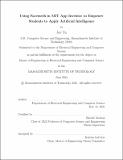Using Facemesh in MIT App Inventor to Empower Students to Apply Artificial Intelligence
Author(s)
Yu, Joy
DownloadThesis PDF (35.92Mb)
Advisor
Abelson, Harold
Terms of use
Metadata
Show full item recordAbstract
It’s possible that a teenager’s first direct contact with artificial intelligence (AI) comes in the form of facial filters that are readily accessible on Instagram and Snapchat. These filters allow users to seemingly transform themselves into animals, put on pieces of clothing, or try out new “looks”. Accompanying active usage, however, is often lack of knowledge or awareness of the technology behind the fun applications. In my work, my goal was to allow youth to access, apply, and understand both AI and AI ethics. I built an open-source FaceExtension tool, an MIT App Inventor extension that uses Facemesh, through which users gain access 486 different facial landmarks on the face. I also designed a middle-school level curriculum to build a cat or lion facial filter camera, published a corresponding online sidebar tutorial on the official "AI with App Inventor" page, and ran workshops with 7-8th grade students. Students with no background in coding or AI could successfully complete the curriculum with enthusiasm, demonstrated by consistent attendance at workshops. Survey results show they gained not only a better understanding for and increased interested in AI, but also new realizations on the importance of AI ethics when applying AI tools. Students also are interested in making different AI facial filters as a means of self-expression and social impact. Importantly, after attending the workshops, students became empowered to create their own apps using AI. Furthermore, professional educators have also tested the curriculum; they not only demonstrated excitement to use FaceExtension in the classroom, but also published their own AI projects using the FaceExtension.
Date issued
2021-06Department
Massachusetts Institute of Technology. Department of Electrical Engineering and Computer SciencePublisher
Massachusetts Institute of Technology